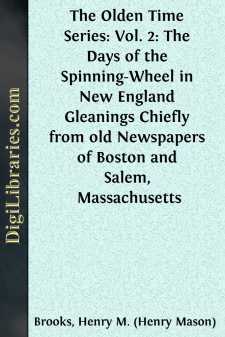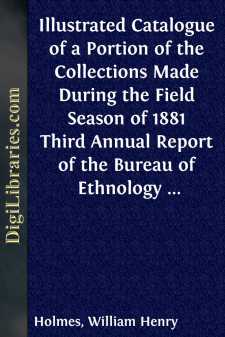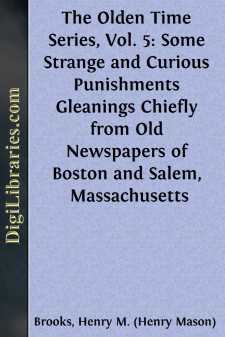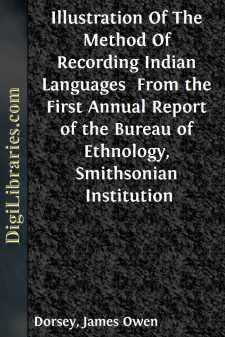History
- Africa 30
- Americas (North Central South West Indies)
- Ancient 68
- Asia 58
- Australia & New Zealand 8
- Canada 41
- Caribbean & West Indies 1
- Civilization 20
- Eastern Europe 12
- Europe 310
- Expeditions & Discoveries 60
- General 77
- Historical Geography 1
- Jewish 9
- Latin America 3
- Medieval 8
- Middle East 14
- Military 248
- Revolutionary 8
- Study & Teaching 5
- United States 353
- Western Europe 56
- World 13
Americas (North Central South West Indies) Books
Sort by:
It is sixty-four years since the original edition of Withers’s Chronicles of Border Warfare was given to the public. The author was a faithful recorder of local tradition. Among his neighbors were sons and grandsons of the earlier border heroes, and not a few actual participants in the later wars. He had access, however, to few contemporary documents. He does not appear to have searched for them, for...
more...
THE DAYS OF THE SPINNING-WHEEL IN NEW ENGLAND. * * * * * WITHIN the last few years many young ladies have searched country houses or ransacked old garrets to find spinning-wheels, which, like old chairs, tall clocks, and warming-pans, have now become objects of curiosity and interest to those who take a fancy to antique articles. It has become fashionable to have these things to adorn our Queen Anne...
more...
INTRODUCTORY. Mr. Palmer began his explorations early in July, 1881, and continued with marked success until the end of the year. He first paid a visit to the Cherokee Indians of North Carolina, and collected a large number of articles manufactured or used by this people, besides a number of antiquities from the same region. From Carolina he crossed into Tennessee, and began work by opening a number of...
more...
SOME STRANGE AND CURIOUS PUNISHMENTS. In the month of January, 1761, "Joseph Bennett, John Jenkins, Owen McCarty, and John Wright were publickly whipt at the Cart's Tail thro' the City of New York for petty Larceny,"—so the newspaper account states,—"pursuant to Sentence inflicted on them by the Court of Quarter Sessions held last Week for the Trial of Robbers," etc. In...
more...
CHILD LIFE From the hour when the Puritan baby opened his eyes in bleak New England he had a Spartan struggle for life. In summer-time he fared comparatively well, but in winter the ill-heated houses of the colonists gave to him a most chilling and benumbing welcome. Within the great open fireplace, when fairly scorched in the face by the glowing flames of the roaring wood fire, he might be bathed and...
more...
CHAPTER I Cuba for Cuba must be the grateful theme of the present volume. We have seen the identification of the Queen of the Antilles with the Spanish discovery and conquest of America. We have traced the development of widespread international interests in that island, especially implicating the vital attention of at least four great powers. We have reviewed the origin and development of a peculiar...
more...
TRANSLATION. Once upon a time the Rabbit dwelt in a lodge with no one but his grandmother. And it was his custom to go hunting very early in the morning. No matter how early in the morning he went, a person with very long feet had been along, leaving a trail. And he (the Rabbit), wished to know him. "Now," thought he, "I will go in advance of the person." Having arisen very early in the...
more...
The conditions which govern the Indian's occupation of his Reserve are, probably, so well known, that any extended reference under this head will be needless. He ceded the whole of his land to the Government, this comprising, originally, a tract which pursued the entire length of the Grand River, and, accepting it as the radiating point, extended up from either side of the river for a distance of...
more...
The great nobles of Peru were allowed, like their sovereign, a plurality of wives. The people, generally, whether by law, or by necessity stronger than law, were more happily limited to one. Marriage was conducted in a manner that gave it quite as original a character as belonged to the other institutions of the country. On an appointed day of the year, all those of a marriageable age - which, having...
more...
by:
Hugh Jones
INTRODUCTION. Dedications and Prefaces, which are prefix'd to most Books, being regarded by few Readers, I think it best for my present Purpose briefly to mention in an Introduction, what I would have known concerning the Occasion, Nature, and Use of this Treatise, before I enter upon the main Work it self. When I considered the great Benefit that arises to the Publick, from the large Colony of...
more...











